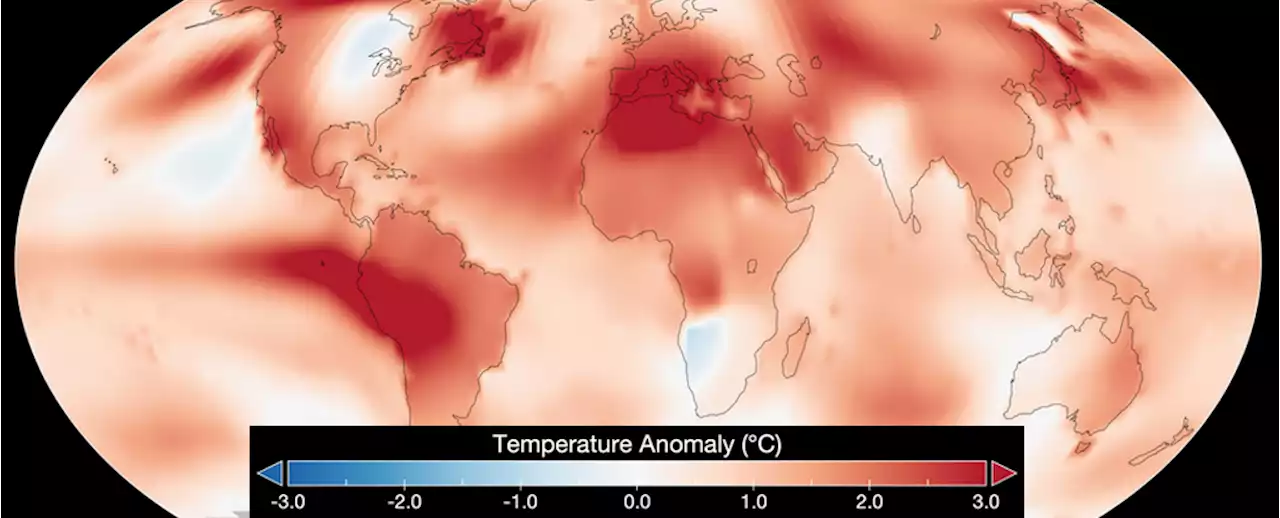According to NASA's GISS, July 2023 was the hottest month on record, with significant temperature increases observed globally. The report underscores the human-driven warming trend, primarily due to greenhouse gas emissions, and highlights the urgent need for climate action. The record heat has been
is long-term temperature changes over many decades and centuries, and a fixed base period yields anomalies that are consistent over time. Temperature “normals” are defined by several decades or more — typically 30 years.
“NASA data confirms what billions around the world literally felt: temperatures in July 2023 made it the hottest month on record. In every corner of the country, Americans are right now experiencing firsthand the effects of the climate crisis, underscoring the urgency of President Biden’s historic climate agenda,” said NASA Administrator Bill Nelson. “The science is clear. We must act now to protect our communities and planet; it’s the only one we have.
This chart shows global temperature anomalies for every July since the 1880s, based on NASA’s GISTEMP analysis. Anomalies reflect how much the global temperature was above or below the 1951-1980 norm for July. Credit: NASA’s Goddard Institute for Space Studies / NASA’s Earth ObservatoryParts of South America, North Africa, North America, and the Antarctic Peninsula were especially hot, experiencing temperatures increases around 7.2F above average.
“Climate change is impacting people and ecosystems around the world, and we expect many of these impacts to escalate with continued warming,” said Katherine Calvin, chief scientist and senior climate advisor at NASA Headquarters in Washington. “Our agency observes climate change, its impacts, and its drivers, like greenhouse gases, and we are committed to providing this information to help people plan for the future.
“This July was not just warmer than any previous July – it was the warmest month in our record, which goes back to 1880,” said GISS Director Gavin Schmidt. “The science is clear this isn’t normal. Alarming warming around the world is driven primarily by human-caused greenhouse gas emissions. And that rise in average temperatures is fueling dangerous extreme heat that people are experiencing here at home and worldwide.”High sea surface temperatures contributed to July’s record warmth.
United States Latest News, United States Headlines
Similar News:You can also read news stories similar to this one that we have collected from other news sources.
 NASA: July Was Hottest Month on Record, But 2024 Looks Even HotterNASA has just confirmed July 2023 was the hottest month since 1880.
NASA: July Was Hottest Month on Record, But 2024 Looks Even HotterNASA has just confirmed July 2023 was the hottest month since 1880.
Read more »
 Best EV Lease And Finance Deals In July 2023Electric cars are more expensive than gas-powered rivals, but they're cheaper to own than gas cars. There's a growing number of appealing deals on them.
Best EV Lease And Finance Deals In July 2023Electric cars are more expensive than gas-powered rivals, but they're cheaper to own than gas cars. There's a growing number of appealing deals on them.
Read more »
 2024 could be even hotter than 2023, NASA saysEl Niño is expected to keep temperatures elevated through spring 2024.
2024 could be even hotter than 2023, NASA saysEl Niño is expected to keep temperatures elevated through spring 2024.
Read more »
 GM Said To Extend 2023 Chevy Bolt EV/EUV Production Into DecemberThe 2023 Bolt EV and Bolt EUV entered production in July 2022, meaning that the 2023 model year of the two EVs will have a production run of 17 months.
GM Said To Extend 2023 Chevy Bolt EV/EUV Production Into DecemberThe 2023 Bolt EV and Bolt EUV entered production in July 2022, meaning that the 2023 model year of the two EVs will have a production run of 17 months.
Read more »
 Earth just had its hottest July 'by a long shot,' NASA and NOAA sayThe planet had its warmest July on record 'by a long shot,' according to NASA and NOAA. The new milestone is just the latest in a series of worrying climate extremes in recent months, including record-warmth across the world’s oceans.
Earth just had its hottest July 'by a long shot,' NASA and NOAA sayThe planet had its warmest July on record 'by a long shot,' according to NASA and NOAA. The new milestone is just the latest in a series of worrying climate extremes in recent months, including record-warmth across the world’s oceans.
Read more »
